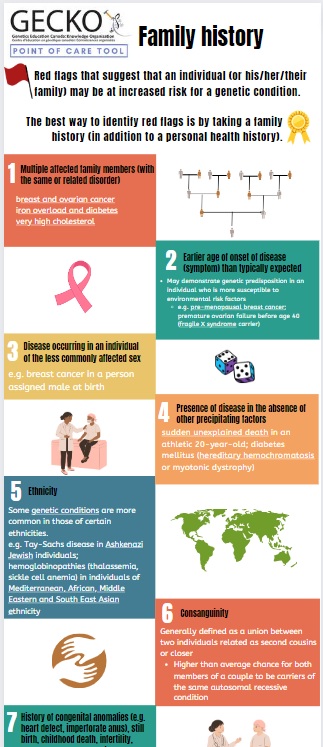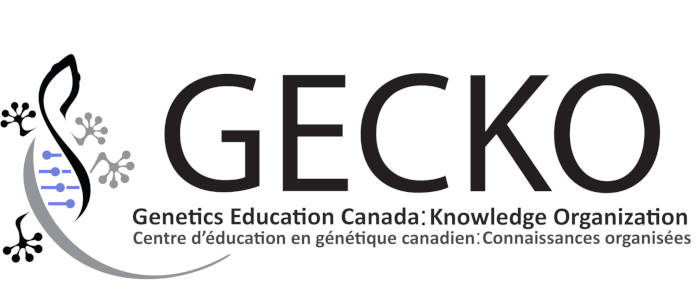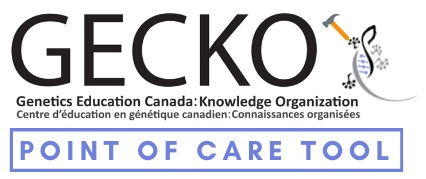Updated Jan 2020
 Point of care tool with family history red flags that may suggest genetic assessment.
Point of care tool with family history red flags that may suggest genetic assessment.
Why take a family history?
1. All diseases have some genetic component, and the strength of the genetic component may be revealed by a family history.
- Family history, alone or in combination with other risk factors, increases the risk for common diseases, (i.e. heart disease, diabetes, and various cancers) much more than genetic variants, alone or in combination, can predict.
2. Even with advancing genomic technology, family history is still the gold standard to assess the likelihood of a genetic condition and to identify individuals who may benefit from referral to a specialist.
3. Pattern of inheritance can be demonstrated by a family history.
4. Family history can help to make or refine a diagnosis, particularly in conditions of variable expressivity (where not all individuals present with the same symptoms of a condition).
For example, in hereditary hemochromatosis, a family history could reveal diabetes, liver failure, heart disease and/or early death in multiple family members.
5. Family history can affect testing, treatment, surveillance and management recommendations.
For example, a woman’s eligibility for the Ontario Breast Screening Program (OBSP) could be determined.
6. Taking the time to explore your patient’s family history is an opportunity to build rapport, provide patient education, and to correct misconceptions.
7. Drawing the family history in a pedigree format makes it easy to be read by other healthcare providers and easy to update.
When should I take a family history?
A good place to start is at your first visit with a new patient.
Risk assessment is an ongoing process, so the family history should be regularly updated.
Take note of the life stage of your patient as questions may vary as patients age. For example, questions relevant for a pediatric patient will be different than those for a woman of childbearing age or a man in his late sixties.
Who should take the family history?
An individual who has experience taking family histories should be tasked with this role. This individual should be able to discuss sensitive topics such as infertility, mental illness, and recent deaths in the family. Taking a family history is a skill that takes practice.
Where should the family history be taken?
There are numerous locations and ways to take a family history. You may use each and/or any of these methods depending on your practice and your patient population. Some ideas are to:
1. Take the family history in your office by asking the patient questions.
2. Have the patient complete a family history questionnaire at home, then review it in your office.
- Mail a questionnaire to the patient before their appointment
- Direct the patient to an online questionnaire
3. Have the patient complete a family history questionnaire in the waiting room and review it in your office.
4. Take the family history over the phone for patients who are at a distance.
How is a family history taken?
For each individual in the family:
- Ask about general health now and in earlier life
- Ask about development and intellectual functioning
- If deceased, ask about the age and cause
Start with your patient and ask about his/her children and his/her partner. Note:
- Consanguinity (“Are you and your partner related by blood e.g. cousins?”)
- Children from previous relationships
- Miscarriages and terminations of pregnancy (note if for medical reason and at what gestational age)
Ask about your patient’s siblings and his/her children (nieces and nephews) and his/her partner’s siblings and their children. Note full or half siblings (“Do your brothers and sisters have the same mother and father?”)
Ask about your patient’s parents and his/her partner’s parents.
If your patient does not have children, ask about grandparents on both sides of the family.
A three generation pedigree is generally accepted as the standard. Once this is complete, ask in general about other relatives, have your patient think of aunts, uncles and cousins, and ask:
- Are there any diseases that seem to run in the family?
- Is there a history of infertility, a couple that had more than three miscarriages, or a couple that had difficulty getting pregnant? If yes, do you know the reason?
- Are there any known genetic conditions in the family, for example cystic fibrosis or muscular dystrophy?
- Was anyone born with a physical difference, for example a hole in the heart or extra digits, or with congenital hearing loss?
- Did any children die at birth or at a young age?
- Is there a history of intellectual disability or developmental delay?
- Is there any cancer in the family? If so, what type and at what age?
- Is there any heart disease at an early age (under age 60)?
Family History Resources
Family history red flags
Tool for taking and recording family history GECKO family history taking tool [updated pedigree symbols published with free access here --> Bennett RL, French KS, Resta RG, Austin J. Practice resource-focused revision: Standardized pedigree nomenclature update centered on sex and gender inclusivity: A practice resource of the National Society of Genetic Counselors. J Genet Couns. 2022 Dec;31(6):1238-1248. PMID: 36106433.]
Learning on your own: Why family history matters - case-based pearls for primary care practice
Resources for providers:
- Validated, primary care family history tool: Emery JD, Reid G, Prevost AT, Ravine D, Walter FM. Development and validation of a family history screening questionnaire in Australian primary care. Ann Fam Med. 2014;12(3):241–249. doi:10.1370/afm.1617 https://www.ncbi.nlm.nih.gov/pmc/articles/PMC4018372/
- Your local genetics centre
Tools for the public:
- This tool helps you create personalized booklets to start conversations about health in one’s family and community by the Genetic Alliance http://www.familyhealthhistory.org/
- My Family Health Portrait by the US Surgeon General https://phgkb.cdc.gov/FHH/html/index.html
–



